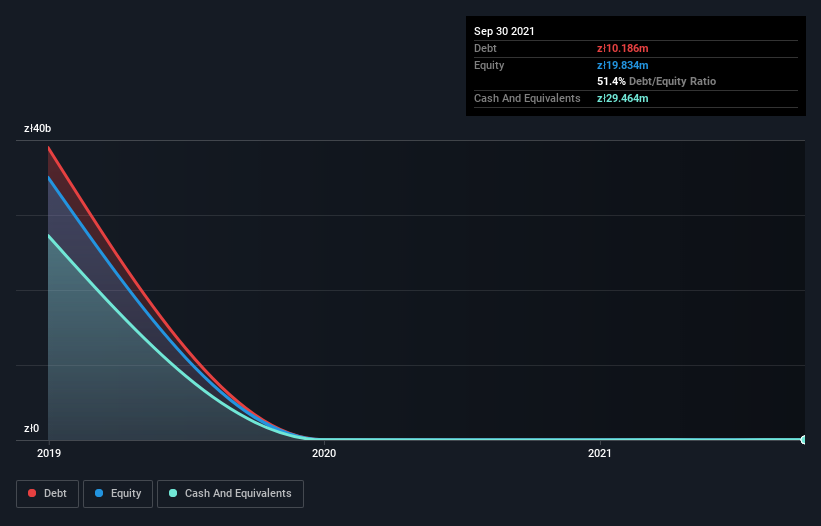David Iben put it well when he said, 'Volatility is not a risk we care about. What we care about is avoiding the permanent loss of capital.' When we think about how risky a company is, we always like to look at its use of debt, since debt overload can lead to ruin. We note that BERG Holding S.A. (WSE:BRH) does have debt on its balance sheet. But the more important question is: how much risk is that debt creating?
Why Does Debt Bring Risk?
Debt and other liabilities become risky for a business when it cannot easily fulfill those obligations, either with free cash flow or by raising capital at an attractive price. In the worst case scenario, a company can go bankrupt if it cannot pay its creditors. However, a more usual (but still expensive) situation is where a company must dilute shareholders at a cheap share price simply to get debt under control. Of course, debt can be an important tool in businesses, particularly capital heavy businesses. The first step when considering a company's debt levels is to consider its cash and debt together.
View our latest analysis for BERG Holding
What Is BERG Holding's Debt?
The image below, which you can click on for greater detail, shows that BERG Holding had debt of zł10.2m at the end of September 2021, a reduction from zł13.7m over a year. However, it does have zł29.5m in cash offsetting this, leading to net cash of zł19.3m.

A Look At BERG Holding's Liabilities
The latest balance sheet data shows that BERG Holding had liabilities of zł42.5m due within a year, and liabilities of zł12.8m falling due after that. Offsetting these obligations, it had cash of zł29.5m as well as receivables valued at zł14.9m due within 12 months. So it has liabilities totalling zł11.0m more than its cash and near-term receivables, combined.
BERG Holding has a market capitalization of zł30.4m, so it could very likely raise cash to ameliorate its balance sheet, if the need arose. But we definitely want to keep our eyes open to indications that its debt is bringing too much risk. Despite its noteworthy liabilities, BERG Holding boasts net cash, so it's fair to say it does not have a heavy debt load! When analysing debt levels, the balance sheet is the obvious place to start. But it is BERG Holding's earnings that will influence how the balance sheet holds up in the future. So when considering debt, it's definitely worth looking at the earnings trend. Click here for an interactive snapshot.
Over 12 months, BERG Holding reported revenue of zł21m, which is a gain of 272%, although it did not report any earnings before interest and tax. That's virtually the hole-in-one of revenue growth!
So How Risky Is BERG Holding?
While BERG Holding lost money on an earnings before interest and tax (EBIT) level, it actually generated positive free cash flow zł7.9m. So taking that on face value, and considering the net cash situation, we don't think that the stock is too risky in the near term. One positive is that BERG Holding is growing revenue apace, which makes it easier to sell a growth story and raise capital if need be. But we still think it's somewhat risky. The balance sheet is clearly the area to focus on when you are analysing debt. However, not all investment risk resides within the balance sheet - far from it. For example BERG Holding has 2 warning signs (and 1 which is significant) we think you should know about.
At the end of the day, it's often better to focus on companies that are free from net debt. You can access our special list of such companies (all with a track record of profit growth). It's free.
Valuation is complex, but we're here to simplify it.
Discover if Berg Holding might be undervalued or overvalued with our detailed analysis, featuring fair value estimates, potential risks, dividends, insider trades, and its financial condition.
Access Free AnalysisHave feedback on this article? Concerned about the content? Get in touch with us directly. Alternatively, email editorial-team (at) simplywallst.com.
This article by Simply Wall St is general in nature. We provide commentary based on historical data and analyst forecasts only using an unbiased methodology and our articles are not intended to be financial advice. It does not constitute a recommendation to buy or sell any stock, and does not take account of your objectives, or your financial situation. We aim to bring you long-term focused analysis driven by fundamental data. Note that our analysis may not factor in the latest price-sensitive company announcements or qualitative material. Simply Wall St has no position in any stocks mentioned.
About WSE:BRH
Berg Holding
Berg Holding S.A. engages in the sale and rental of real estate properties business in Poland.
Excellent balance sheet and good value.
Market Insights
Community Narratives


Recently Updated Narratives


MINISO's fair value is projected at 26.69 with an anticipated PE ratio shift of 20x


Fiverr International will transform the freelance industry with AI-powered growth

Constellation Energy Dividends and Growth
Popular Narratives


MicroVision will explode future revenue by 380.37% with a vision towards success


NVDA: Expanding AI Demand Will Drive Major Data Center Investments Through 2026



